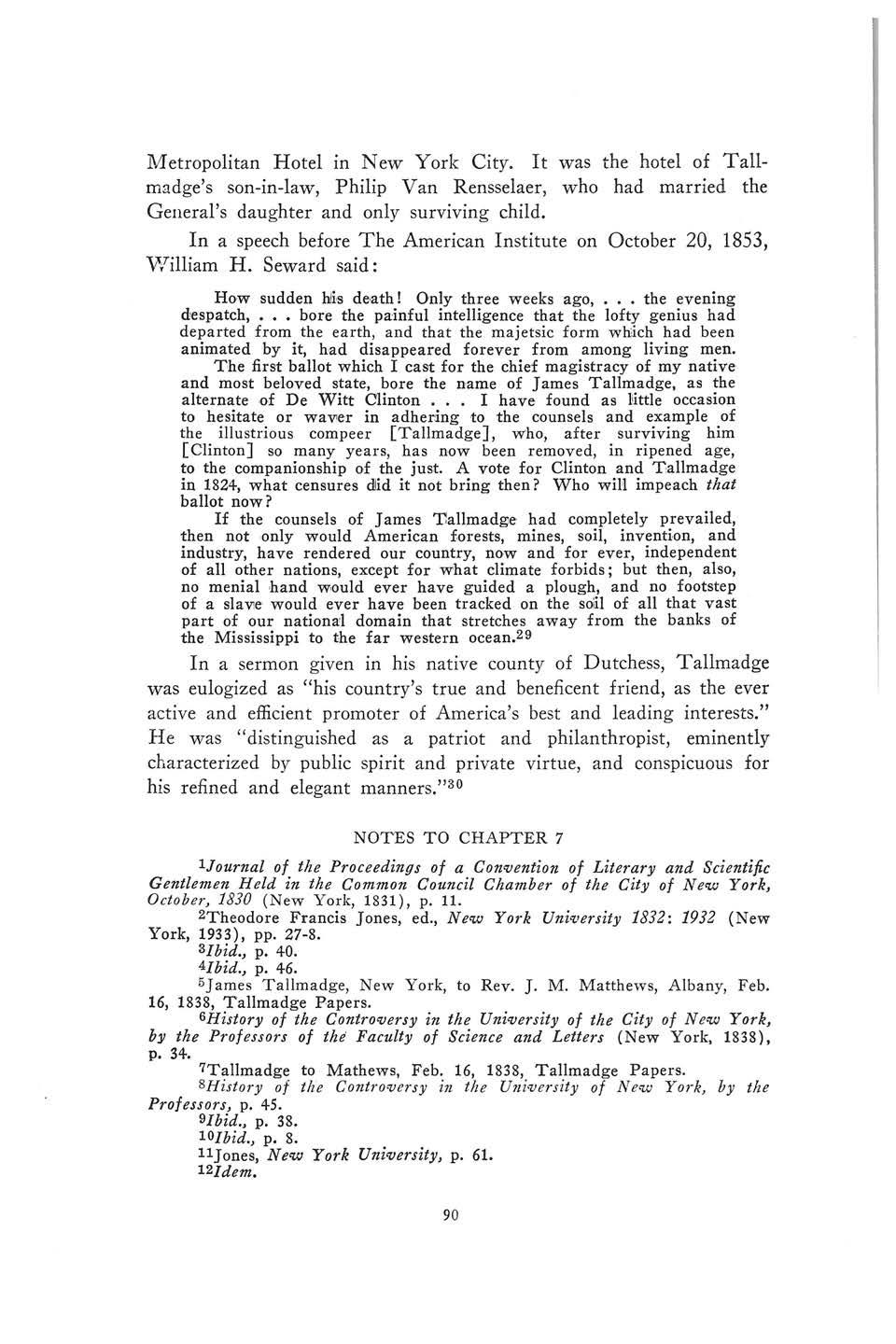
14 minute read
Bible Records of Dutchess County Families
Metropolitan Hotel in New York City. It was the hotel of Tallma dge's son-in-law, Philip Van Rensselaer, who had married the General's daughter and only surviving child.
In a speech before The American Institute on October 20, 1853, William H. Seward said:
How sudden his death! Only three weeks ago, . . . the evening despatch, . . . bore the painful intelligence that the lofty genius had departed from the earth, and that the majetsic form which had been animated by it, had disappeared forever from among living men. The first ballot which I cast for the chief magistracy of my native and most beloved state, bore the name of James Tallmadge, as the alternate of De Witt Clinton . . . I have found as little occasion to hesitate or waver in adhering to the counsels and example of the illustrious compeer [Tallmadge], who, after surviving him [Clinton] so many years, has now been removed, in ripened age, to the companionship of the just. A vote for Clinton and Tallmadge in 1824, what censures did it not bring then? Who will impeach that ballot now? If the counsels of James Tallmadge had completely prevailed, then not only would American forests, mines, soil, invention, and industry, have rendered our country, now and for ever, independent of all other nations, except for what climate forbids; but then, also, no menial hand would ever have guided a plough, and no footstep of a slave would ever have been tracked on the soil of all that vast part of our national domain that stretches away from the banks of the Mississippi to the far western ocean.23
In a sermon given in his native county of Dutchess, Tallmadge was eulogized as "his country's true and beneficent friend, as the ever active and efficient promoter of America's best and leading interests." He was "distinguished as a patriot and philanthropist, eminently characterized by public spirit and private virtue, and conspicuous for his refined and elegant manners."30
NOTES TO CHAPTER 7
'Journal of the Proceedings of a Convention of Literary and Scientific Gentlemen Held in the Common Council Chamber of the City of New York, October, 1830 (New York, 1831), p. 11. 2Theodore Francis Jones, ed., New York University 1832: 1932 (New York, 1933), pp. 27-8. 3/ bid., p. 40. 4/bid., p. 46. 5James Tallmadge, New York, to Rev. J. M. Matthews, Albany, Feb. 16, 1838, Tallmadge Papers. 6History of the Controversy in the University of the City of New York, by the Professors of the Faculty of Science and Letters (New York, 1838), p. 34.
7Tallmadge to Mathews, Feb. 16, 1838, Tallmadge Papers. 8History of the Controversy in the University of New York, by the Professors, p. 45. 3/bid., p. 38. 10/bid., p. 8. "Jones, New York University, p. 61. nidem.
90
13 14 /bid., p. 62. ifistorical Catalogue of Brown University, p. 68. 15Joshua L. Chamberlain, ed., New York University its History, Influence, Equipment and Characteristics (Boston, 1901), p. 90. isjddress Delivered May 20, 1837, in the Chapel of the University of the City of New York, on Occasion of the Dedication of the Building to the Purposes of Science, Literature, and Religion, by the Hon. James Tallmadge, Esq. President of the Council (New York, 1837), p. 7.
17/bid., p. 11. 18/bid., pp. 8-9. 19/bid., p. 7. 20jddress of the Friends of Domestic Industry, Assembled in Convention, at New York, October 26, 1831, to the People of the United States (Baltimore, 1831), p. 39. 21Address Delivered at the close of the Sixteenth Annual Fair of The American Institute, Held at Niblo's Saloon, New-York, October, 1843, by the Hon. James Tallmadge, President of the Institute (New York, 184-3), p. 3. 22American Institute. Seventeenth Annual Fair. Agricultural Convention, New York, Oct. 11, 1844. Remarks of the Honourable James Tallmadge, President of the Convention, on the Commercial Policy of England, Affecting the Interests of American Agriculture (New York, 1844), p. 12. 23/bid., p. 4. 24/bid., p. 9. 25Address before The American Institute at the close of its Fourteenth Annual Fair, on the 26th of October, 1841, by Gen. James Tallmadge, President of the Institute (New York, 184-1), p. 6. 26/bid., p. 10. 27[Anon.] The West Vindicated. A Review (in part) of the Address of General James Tallmadge, before The American Institute, Oct. 26, 1841, by a western New Yorker (Buffalo, 184-2), pp. 3-4. 28ilmerican Institute. Seventeenth Annual Fair. Oct. 11, 1844. Remarks of James Tallmadge, p. 7; Malone, Dictionary of American Biography, XVIII, 285. 29Baker, Life of William H. Seward, pp. 159-60. 30A Sermon, Occasioned by the Death of the Hon. James Tallmadge, Delivered in Zion Church, Franklindale, Dutchess County, on Sunday Morning, Oct. 9, 1853, by the Rev. Geo. B. Andrews, Rector (Poughkeepsie, 1853), pp. 14, 20.
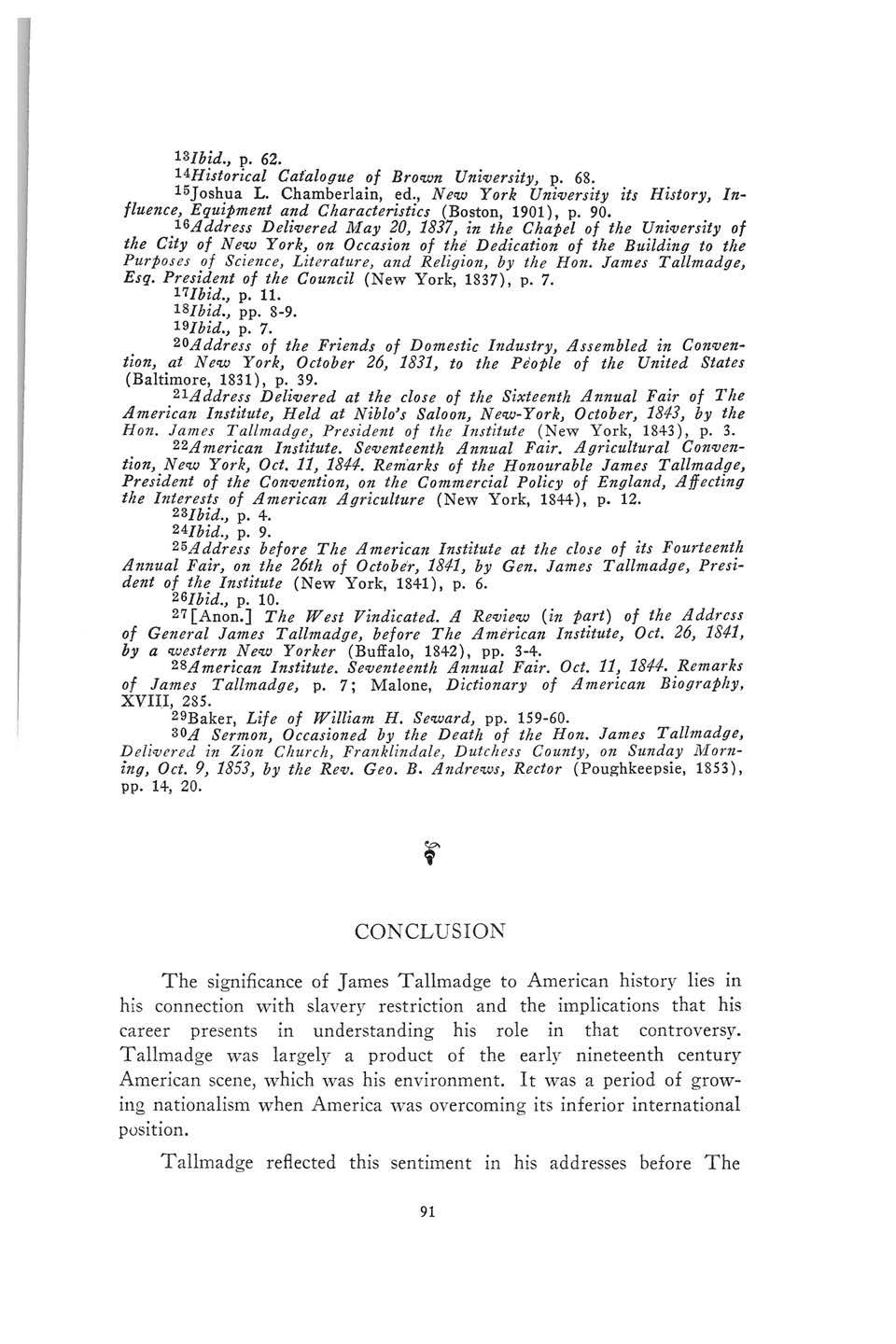
CONCLUSION
The significance of James Tallmadge to American history lies in his connection with slavery restriction and the implications that his career presents in understanding his role in that controversy. Tallmadge was largely a product of the early nineteenth century American scene, which was his environment. It was a period of growing nationalism when America was overcoming its inferior international position.
Tallmadge reflected this sentiment in his addresses before The
91
American Institute and also glorified American material progress which he incorporated into his utilitarian ideas of education. He was h:inself an example of the advancing social democracy, for his father had been a blacksmith and farmer while Tallmadge gained a college education and became a lawyer and politician. However, he was not immune to sectionalism, for he mirrored the protective tariff economics of the manufacturing Northeast. Tallmadge also reflected the prevalent American theories on government, supporting the separation of powers and republicanism, but with broader democratic methods. At the same time, his study of the ancient republics gave him a sincere fear of extreme democracy.
Tallmadge possessed no great legal mind, for he could only see what was politically expedient and failed to perceive the logical conclusions of his ideas. His zealous support of the popular election of presidential electors in New York State was prompted more by a desire to prevent Bucktail control of the situation than by democratic beliefs. The manner of thinking was not unusual for one who was politically fostered by an active spoils system formulated on a personal basis, and therefore, conducive to political management and tact rather thai1 party discipline. Perhaps this training was his undoing, for his actions seemed to quell political success.
The major historical importance of James Tallmadge lies in the significance of the Tallmadge Amendment that he proposed in Congress, which provided for the prohibition of slavery in Missouri. This amendment precipitated a national crisis of prime historical importance to the slavery issue of the ante-bellum period.
Tallmadge's significance is not derived from his congressional role in the Missouri controversy and Compromise, but rather in his being a link in determining the cause and the author of slavery restriction. Any valid thesis about this problem must begin with a study of Tallmadge but the treatment of his own career must be directed toward and subordinated to the solution of the question.
It is fairly evident, and historians seem to agree, that the Tallmadge Amendment, though ostensibly moral in purpose, was a political rather than humanitarian measure. Mounting northern opposition to the leadership of the Virginia Dynasty, and Tallmadge's own record as a slaveholder, support this thesis. The political implications became clearer when the argument centered about the ":njustice" of the three-fifths representation clause and the balance of free and slave states. The hope was to create a new political party
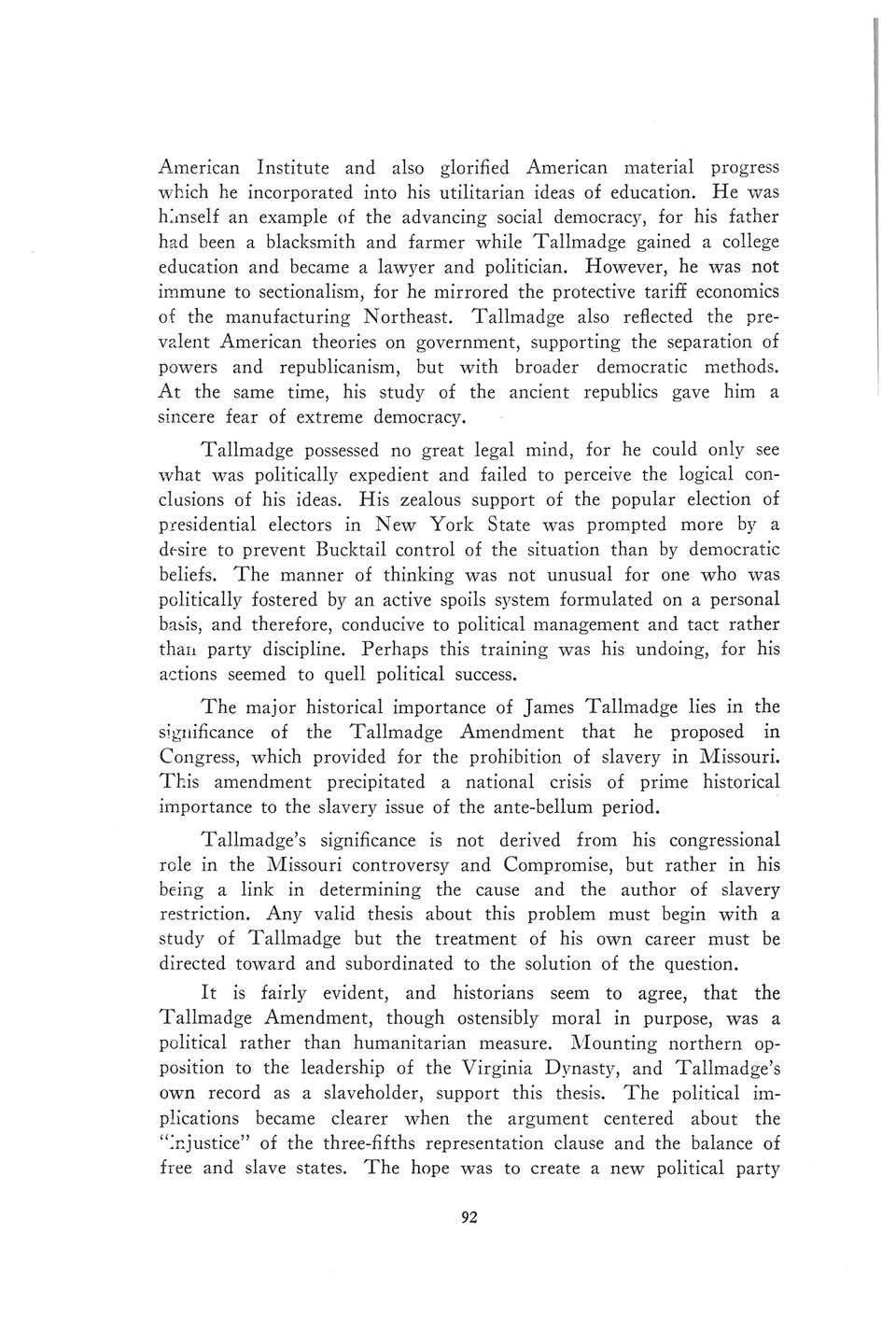
92
along . geographical lines but this did not fully materialize.
The real significance of Tallmadge's part in this issue was his link with the originator of slavery restriction. There is no reason to believe that this restriction originated with Tallmadge. He was not a politician in his own right at that time, but merely a political servant raised and nurtured by De Witt Clinton. This study presents strong evidence for assessing the authorship of restriction as that of De Witt Clinton. Tallmadge's desire not to return to Congress, his subsequent neglect by Clinton of an appointive reward and his resulting desertion of Clinton, all suggest that he had gone to Congress to perform this very important service for Clinton.
Having been reared in a personal spoils system, James Tallmadge would naturally have reacted in this way. To further support the contention that Clinton was the author of restriction or at least responsible for its introduction, the record has been given of Clinton's own ambitious and reckless pursuit of the presidency, besides the intricate political alliances which eliminate other factions from consideration. All the evidence points to the same conclusion. The personal and political relationship between Tallmadge and Clinton was real and positive; though abruptly terminated, its effects were lasting, both in state politics and in the development of great national issues.
If this view is accepted, the mission of De Witt Clinton, as the challenger of the Virginia Dynasty and the dissolver of the Jeffersonian alliance with New York, assumes an historical importance transcending his share in the attempt to restrict the spread of slavery and the resultant compromise on the statehood of Missouri.
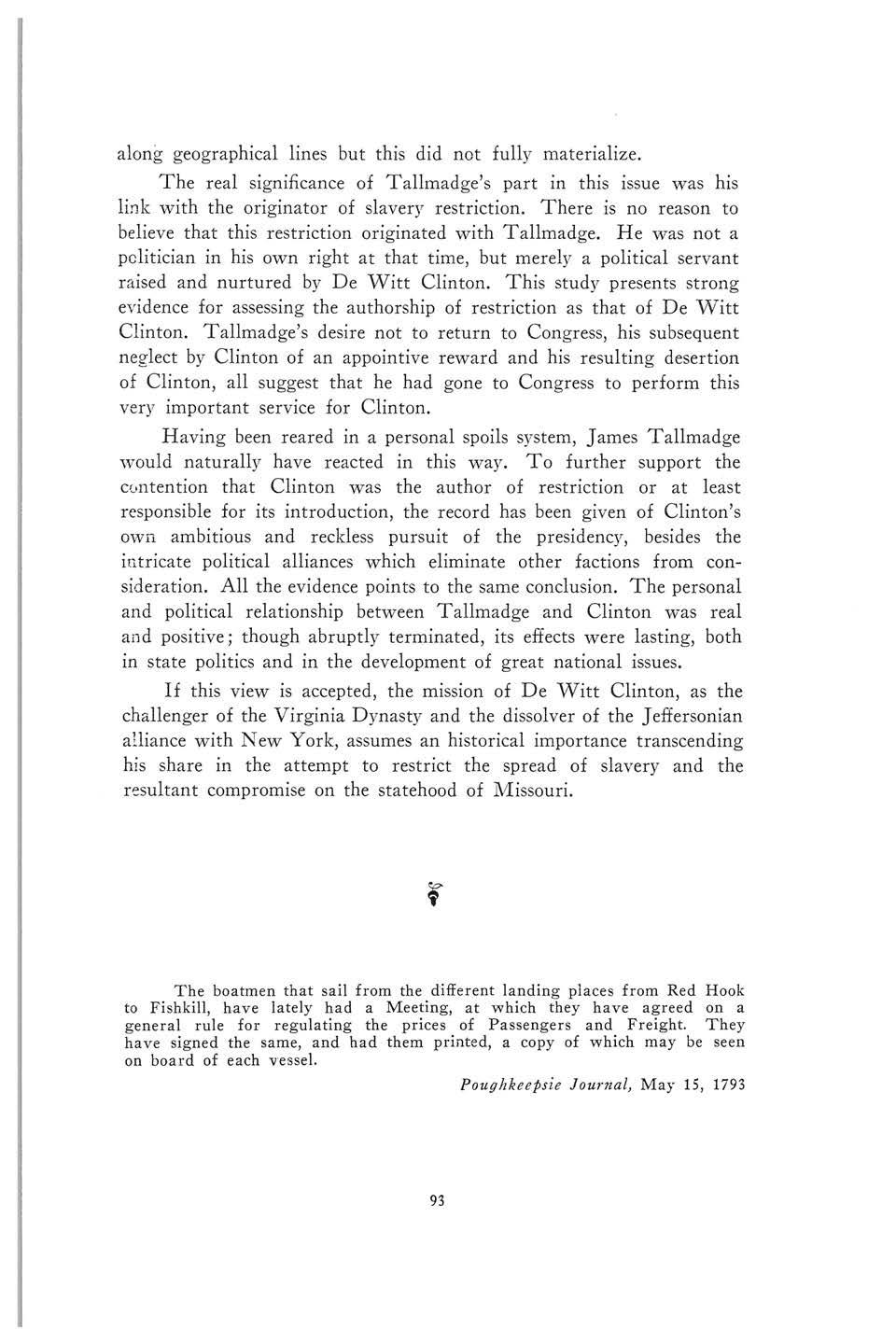
The boatmen that sail from the different landing places from Red Hook to Fishkill, have lately had a Meeting, at which they have agreed on a general rule for regulating the prices of Passengers and Freight. They have signed the same, and had them printed, a copy of which may be seen on board of each vessel.
Poughkeepsie Journal, May 15, 1793
93
BIBLE RECORDS OF DUTCHESS COUNTY FAMILIES
A COOKINGHAM FAMILY BIBLE
BIBLE, . . . ; Old and New Testaments. . . . Nurnberg, 1755. For some months one of the trustees of the Dutchess County Historical Society, Mr. Harris N. Cookingham, had tried to locate the family Bible and in 1960 he appealed to this society for help. He wished to insure the preservation of the volume and its records and planned, if he could purchase it, to present it to the society. After the publication of his request in the year book, it was surprising and gratifying to receive word from the late Mrs. C. Jonathan Slocum of Beacon that she had, in a collection of local historical material, a Bible printed in 1755 which contained Cookingham family records. Mrs. Slocum was pleased to present the volume to the Dutchess County Historical Society. There are no pages designed for family records and the items are written on blank pages in the front and back and on the inside of the back cover. Many of the entries can be confirmed in the register of St. Paul's German Lutheran Church at Wurtemburgh and by inscriptions on the gravestones in the cemetery attached to that church. The records are in German and English and a combination of both and include those of the family of Michael Boltz (or Pultz), Jr., in addition to the Cookingham items. The entries have been copied and translated, as follows: Michael Cookingham was born July 2, 1757 Elizabeth Ackert, 2nd wife to Michael Cookingham, was born November 20, 1786 Margaret Cookingham was born May 26, 1786 Phillip Cookingham was born April 24, 1788 Daniel Cookingham was born October 26, 1793 Gertrude Cookingham was born March 20, 1797 Jonas Cookingham was born October 8, 1805 Conrad Cookingham was born March 29, 1827
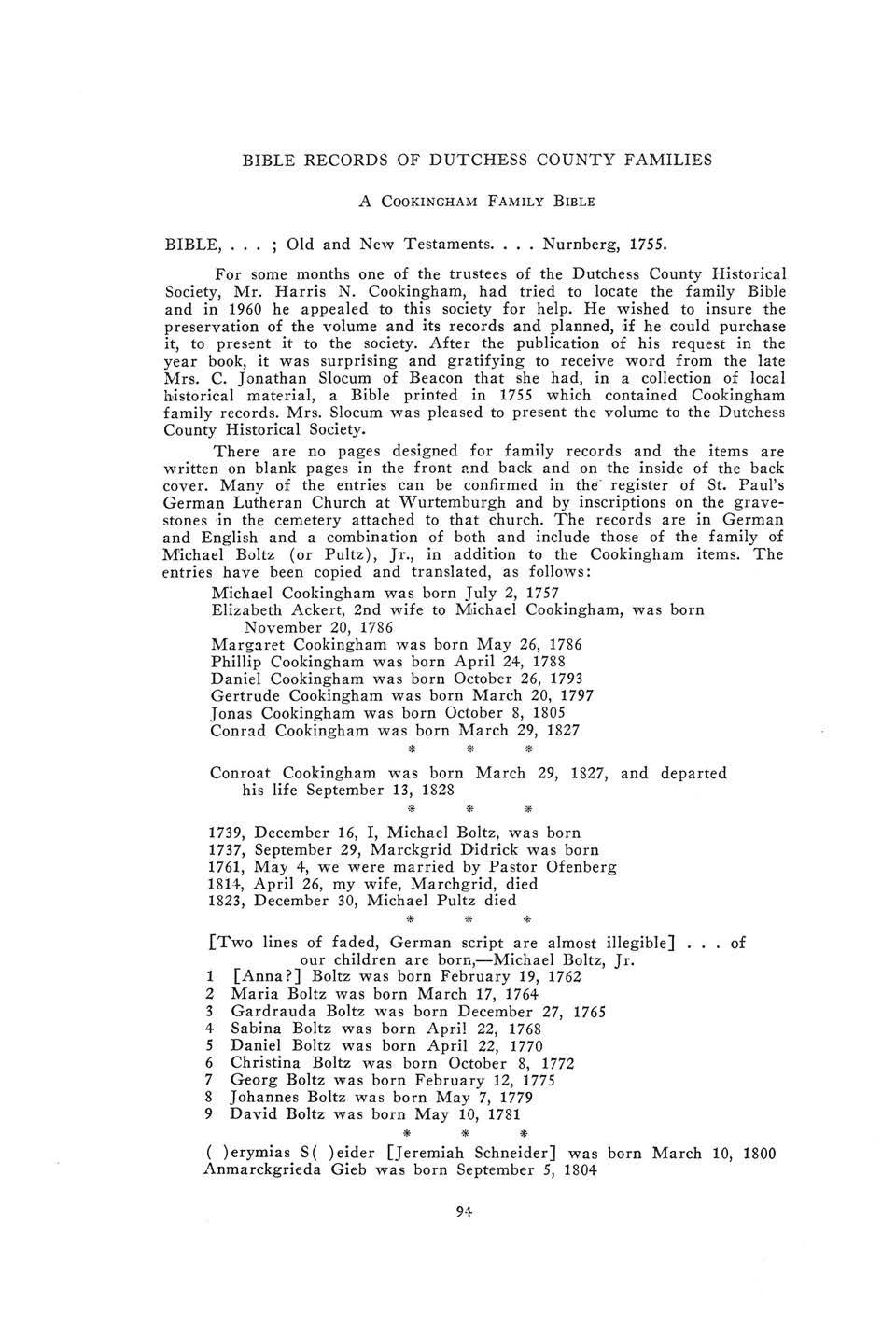
Conroat Cookingham was born March 29, 1827, and departed his life September 13, 1828 * 1739, December 16, I, Michael Boltz, was born 1737, September 29, Marckgrid Didrick was born 1761, May 4, we were married by Pastor Ofenberg 1814, April 26, my wife, Marchgrid, died 1823, December 30, Michael Pultz died
[Two lines of faded, German script are almost illegible] . . . of our children are born,-Michael Boltz, Jr. 1 [Anna?] Boltz was born February 19, 1762 2 Maria Boltz was born March 17, 1764 3 Gardrauda Boltz was born December 27, 1765 4 Sabina Boltz was born April 22, 1768 5 Daniel Boltz was born April 22, 1770 6 Christina Boltz was born October 8, 1772 7 Georg Boltz was born February 12, 1775 8 Johannes Boltz was born May 7, 1779 9 David Boltz was born May 10, 1781
( )erymias S( )eider [Jeremiah Schneider] was born March 10, 1800 Anmarckgrieda Gieb was born September 5, 1804
91.
Mr. Cookingham has supplied the following items which were copied some years ago from an earlier family Bible, owned by Daniel Cookingham who came to America with the Palatine migration of 1737 and who was married December 9, 1756, by the Reverend John Casper Rubel, to Anna Maria Traver, daughter of Sebastian Traver and Christina Uhl: Children of Daniel and Anna Maria: John Michael born July 2, 1757 Frederick November 26, 1758 Catherine October 4, 1760 Christina June 7, 1762 Anna October 29, 1763 Gertrude August 8, 1765 Hans George April 20, 1767 Elizabeth March 1769 David February 9, 1771 Magdalena May 18, 1773 Margaretha May 15, 1775 Adam Children of John Michael, who married on May 18, 1784, Agnes Marquet and, on April 19, 1824, Elizabeth Acker, widow of Henry Nichol: Catherine born May 29, 1786 Phiilip September 26, 1788 Daniel October 26, 1793 Gertrude March 20, 1797 Jonas October 8, 1805 Children of Daniel (born October 26, 1793), who married Margaret Crapser (born January 24, 1797) : Sarah born Matilda Michael June 6, 1822 Children of Michael (born June 6, 1822), who married Abigail Harris: Harris Llewellyn born August 21, 1850; married May 18, 1876, Mary J. Nicks [born April 11, 1852] jchn Calvin; married Mary Carpenter
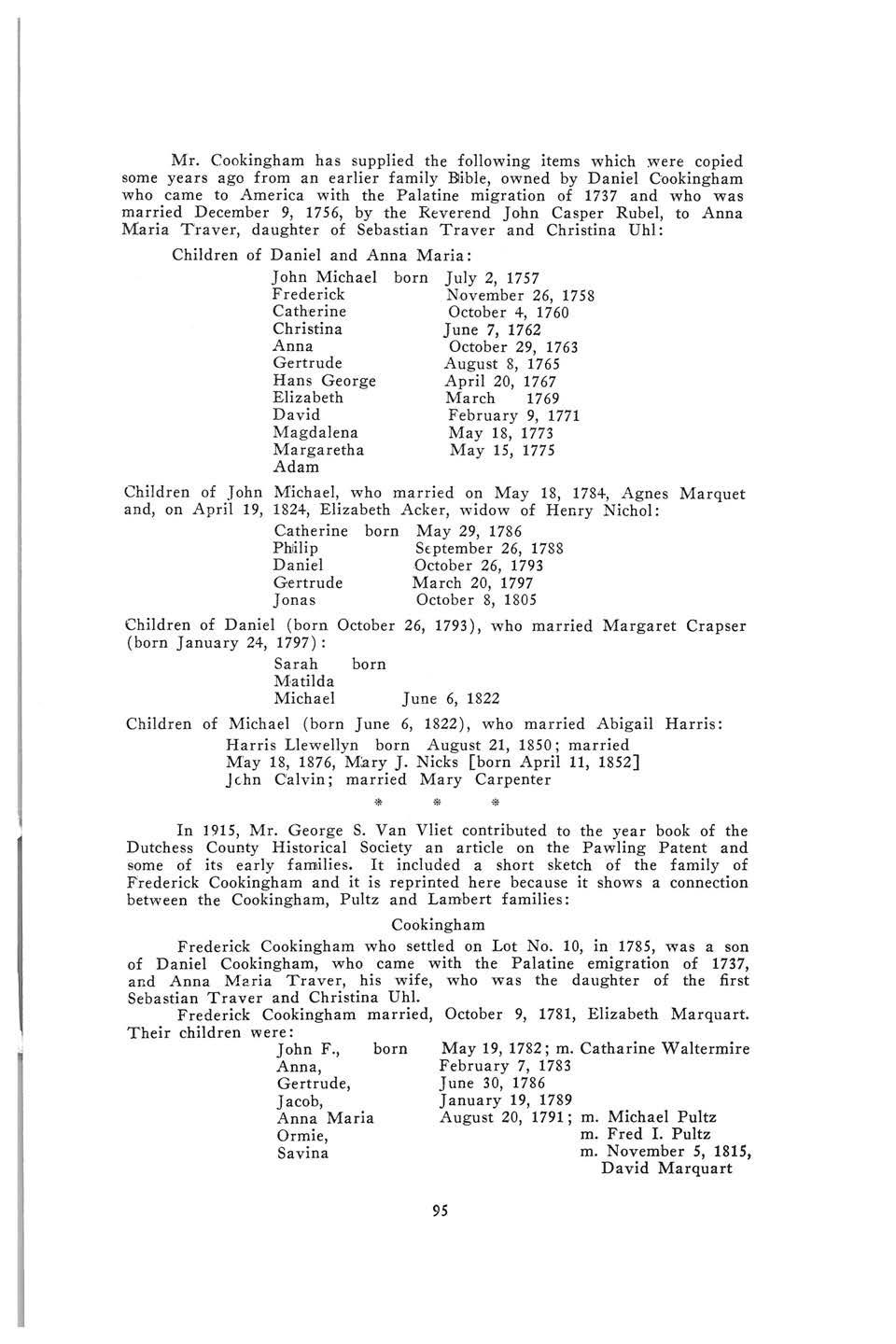
In 1915, Mr. George S. Van Vliet contributed to the year book of the Dutchess County Historical Society an article on the Pawling Patent and some of its early families. It included a short sketch of the family of Frederick Cookingham and it is reprinted here because it shows a connection between the Cookingham, Pultz and Lambert families: Cookingham Frederick Cookingham who settled on Lot No. 10, in 1785, was a son of Daniel Cookingham, who came with the Palatine emigration of 1737, and Anna Maria Traver, his wife, who was the daughter of the first Sebastian Traver and Christina Uhl. Frederick Cookingham married, October 9, 1781, Elizabeth Marquart. Their children were: John F., born May 19, 1782; m. Catharine Waltermire Anna, February 7, 1783 Gertrude, June 30, 1786 Jacob, January 19, 1789 Anna Maria August 20, 1791; m. Michael Pultz Ormie, m. Fred I. Pultz Savina m. November 5, 1815, David Marquart
95
Rebecca January 9, 1798; m. Andrew Fultz William 1802; m. Catharine Traver Andrew June 20, 1806; m. Lucy Lambert Michael Cookingham, brother of Frederick, located on Lot No. 12. He married, first, Agenes Marquart, by whom he had the following children: Catharine, born May 29, 1786 Philip April 24-, 1788; m. Elizabeth Smith;
Elizabeth
m. (2) Anna Fradenburg November 20, 1790 Daniel October 26, 1793; m. Margaret Crapser Gertrude March 20, 1797; m. Timothy Crapser Jonas October 8, 1805; m. Catharine Marquart
LAMBERT FAMILY BIBLE
[No title page, no date] German Bible presented to the Dutchess County Historical Society by Mr. Harris N. Cookingham. There is no section for family records and the items are written on pages where there is some blank space: page 529 George Lambert, Junier, was born January 18, 1778 Anna Bultz was born April 5, 1782 George Lambert, Junier, was married to Anne Bultz Henry Lambert was born December 12, 1800 Eliza Fraleigh was born March 2, 1802 and my son John Henry was born September 18, 1820
back of page 913
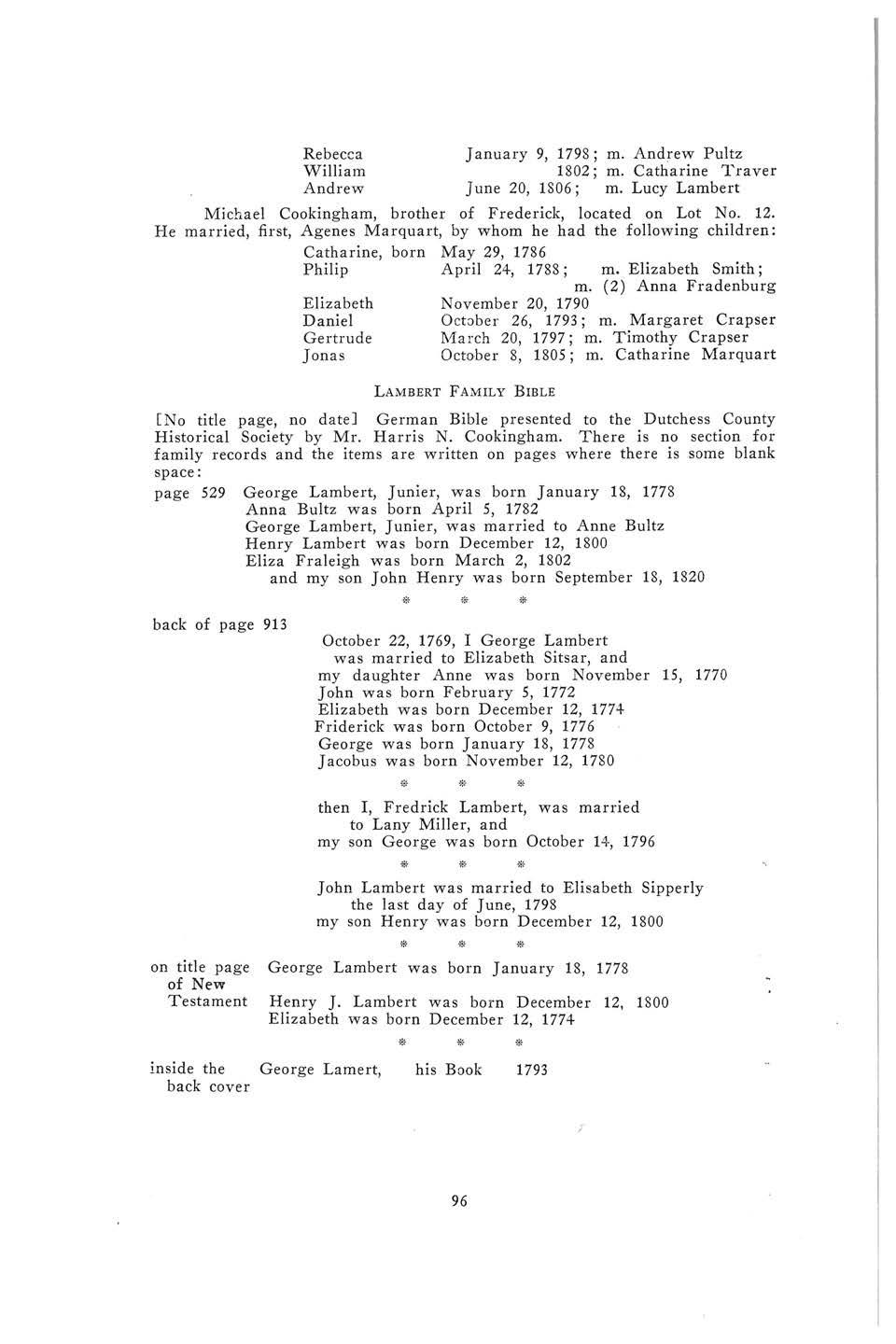
October 22, 1769, I George Lambert was married to Elizabeth Sitsar, and my daughter Anne was born November 15, 1770 John was born February 5, 1772 Elizabeth was born December 12, 1774 Friderick was born October 9, 1776 George was born January 18, 1778 Jacobus was born November 12, 1780
then I, Fredrick Lambert, was married to Lany Miller, and my son George was born October 14, 1796
John Lambert was married to Elisabeth Sipperly the last day of June, 1798 my son Henry was born December 12, 1800
on title page George Lambert was born January 18, 1778 of New
Testament Henry J. Lambert was born December 12, 1800 Elizabeth was born December 12, 1774
inside the George Lamert, his Book 1793 back cover
96










